South Sudan president rejects removal of vice-president post
November 12, 2014 (JUBA) – South Sudan’s president, Salva Kiir, has unequivocally rejected any proposal seeking to abolish the position of vice-president, his office said on Wednesday.

In an exclusive interview with Sudan Tribune, presidential spokesperson Ateny Wek Ateny said that the South Sudanese leader had clearly articulated his views on the matter.
The Machar-led rebel faction is calling for the position of vice-president to be scrapped off and replaced with a prime minister.
“The view of the president is that someone who has been with him, stood with him during difficult moments like comrade James Wani Igga cannot be removed from his position at the whim of some people, whatsoever the case,” he said.
“The president rejects this proposal. The removal of the vice-president is a non-starter. It is a complete red-lines’ issue to be discussed,” he added.
The statements come after cabinet affairs minister Martin Elia Lomuro denied on Tuesday that any such a proposal was ever tabled before government or mediators from the Intergovernmental Authority on development (IGAD).
The minister maintained the IGAD protocol of agreed principles, which place the vice-president above that of prime minister, remain the basis of negotiations and
Meanwhile, Ateny warned that such demands could derail the whole peace process.
South Sudan’s adopted system of governance is a presidential system and clearly recognises the position of vice-president as part of the presidency, he said.
“The position of the vice-president is in the constitution. His duties are clearly spelled out in the constitution. He becomes the acting president when the president travels out of the country,” he said.
“This position will always be there until when the people of this country decide the type of system of governance they want,” he added.
The presidential aide also denied the government had accepted a proposal giving the prime minister executive powers, arguing that powers are invested in people.
The South Sudanese government has been engaged in an armed struggle with pro-Machar opposition forces since mid-December last year, with IGAD-led negotiations so far failing to yield a lasting political settlement to the crisis.
On 9 November, both rival parties signed an agreement in Ethiopia rededicating themselves to cease hostilities and withdraw all foreign allied forces from the territory of South Sudan.
The deal came after Kiir and Machar reached a consensus agreed on most of the issues relating to power-sharing arrangements between the president and the prime minister.
That agreement provides for the two principals to command their respective armies during the transitional period until an integration process is completed.
This will also include deployment of joint presidential guards of the same size from the two factions in the capital, Juba.
However, a permanent ceasefire is yet to be signed after all the security arrangements have been worked out and agreed upon by the two factions.
However, observers say the 9 November agreement has only a slim chance of being fully implemented, citing ongoing violations by both sides of previous agreements already in place.
(ST)
